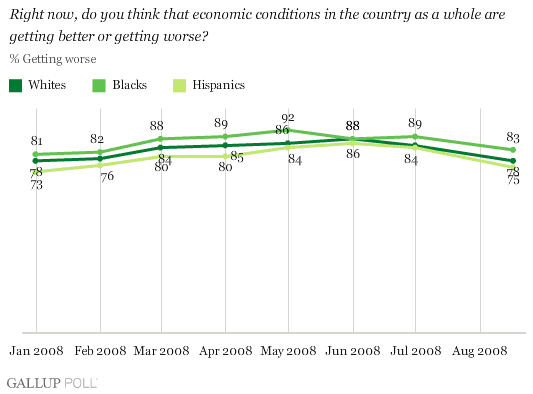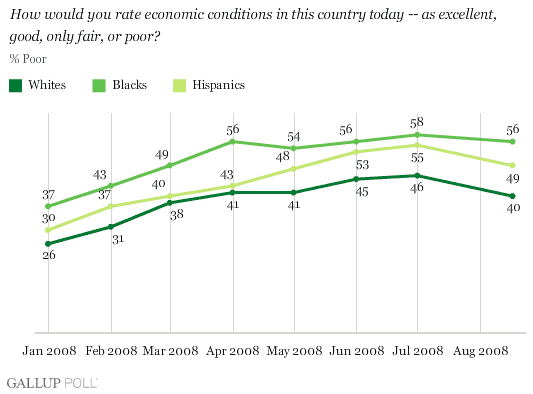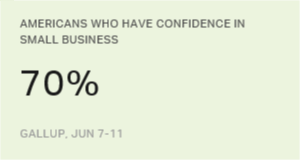PRINCETON, NJ -- Among Americans surveyed during the first half of August, 83% of blacks, 78% of whites, and 75% of Hispanics say current economic conditions are "getting worse," but all three groups are less pessimistic than they were last month. Expectations for the future course of the economy are essentially back at January-February levels.

Consumers Getting a Little Less Gloomy
Plunging global oil prices have been reflected in steadily declining U.S. gas prices at the pump over the past month. As a result, consumers' expectations for the direction of the economy have become somewhat less pessimistic in the first half of August, with 78% of Americans saying the economy is "getting worse," compared to 85% in July and 87% in June. The degree of pessimism has lessened among whites, blacks, and Hispanics compared to July, while the differences in their economic expectations remain in a relatively tight range of only 8 percentage points.
Consumers also rate current economic conditions somewhat less negatively in the first half of August than they did during the last two months, with 43% currently rating the economy "poor," compared to 48% in July and 47% in June. Differences in August ratings by race and ethnicity are more pronounced, with 56% of blacks, 49% of Hispanics, and 40% of whites rating current economic conditions "poor."

Commentary
Today's economic headlines illustrate how consumers have lots of reasons to be pessimistic about current and future economic conditions in the United States. The Labor Department reported Tuesday that producer prices were up the most in 27 years on an annual basis in July. At the same time, the Commerce Department reported that builders began building the fewest new homes in 17 years during July.
The consumer credit crunch continues to worsen, with the Federal Reserve reporting that banks are tightening their lending standards, according to its quarterly Senior Loan Officer Survey, released last week. Further, the job market continues to deteriorate, as .
On the other hand, oil prices are down 21% from the beginning of July, and gas prices at the pump have declined steadily over the past month. So, it is not surprising that Ā鶹“«Ć½AV's consumer confidence measures show consumers to be somewhat less pessimistic about the future direction of the economy than they were last month while remaining highly pessimistic overall.
However, it is interesting to see that although more blacks and Hispanics than whites have consistently rated economic conditions as "poor," the expectations of all three groups have all been extremely negative over the past several months. And, the decreasing pessimism during the first half of August has also been relatively consistent across all three groups. No matter how one looks at it, whites, blacks, and Hispanics all seem to agree that right now, the U.S. economy is pretty lousy, but .
Survey Methods
Ā鶹“«Ć½AV is interviewing no fewer than 1,000 U.S. adults nationwide each day during 2008. The economic questions analyzed in this report are asked of a random half-sample of respondents each day. The results reported here are based on combined data of more than 8,000 interviews each in January, February, March, April, May, June, and July. For results based on these samples, the maximum margin of sampling error is Ā±1 percentage point.
The questions for August are based on combined data of more than 8,000 interviews conducted Aug. 1-17, 2008. For results based on this sample, the maximum margin of sampling error is Ā±2 percentage points.
Interviews are conducted with respondents on land-line telephones (for respondents with a land-line telephone) and cellular phones (for respondents who are cell-phone only).
In addition to sampling error, question wording and practical difficulties in conducting surveys can introduce error or bias into the findings of public opinion polls.
To provide feedback or suggestions about how to improve Ā鶹“«Ć½AV.com, please e-mail feedback@gallup.com.
